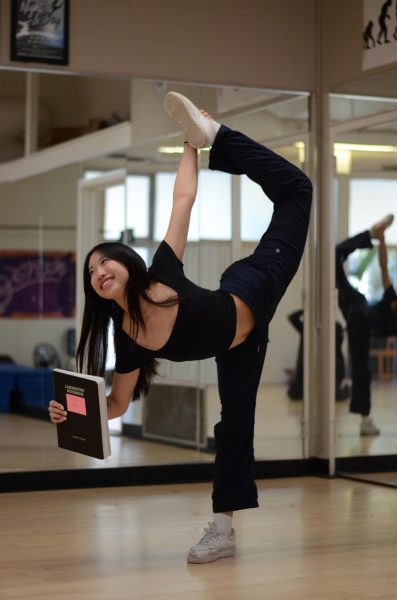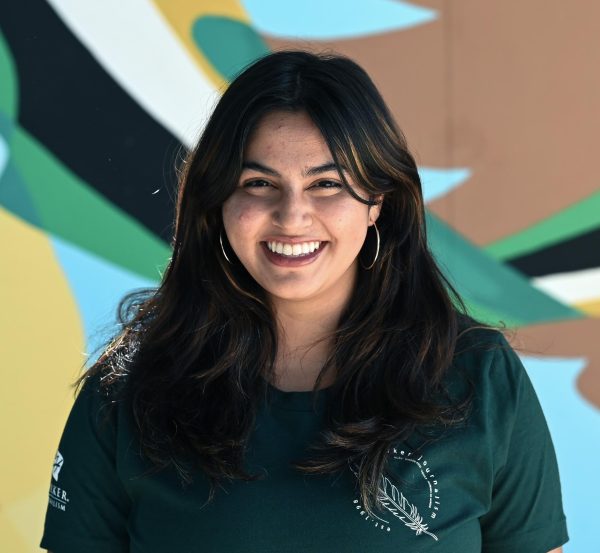
As the blackout curtain lifts, unveiling the silhouettes of members of the Harker Dance Company lined up in straight rows on stage, cheers and whoops echo from the audience who anticipate the performance to come as dancers lower their heads on the darkened stage.
“HDC!” Emily Kwan (12) yells, and a hush falls over the crowd as the dancers strike their starting poses with precision. The melody swells, and the dancers begin their performance in synchronized movement.
Emily first began dancing in first grade when she joined Harker’s lower school dance program. Motivated to continue dance on a higher level, Emily sought to join the audition group, Dance Fusion, in fourth grade. Soon after, she joined Dance Academy USA in seventh grade and their competitive team a year later. Nurturing her passion for dance led Emily to carry that ambition to HDC at the upper school.
“When I was in Dance Fusion, I would dream about getting into Showstoppers, and my mind wasn’t even thinking about the possibility of going on HDC,” Emily said. “Being able to be captain and then being able to lead such an amazing group of dancers and people has just been a full circle moment. Back in sixth grade, when I was in Fusion, lower and middle school dance teacher Ms. Gale chooses someone, one person, to yell fusion at the beginning of every dance, so now when I get to yell HDC as captain, it’s heartwarming.”
In her candidacy speech while running for a co-captain position on HDC, Emily advocated for the importance of building connections and tight relationships within the team and how that translates into general growth. Whether in rehearsal or backstage together, Emily hopes to foster a supportive environment within the team that translates on stage. HDC teammate Claire Cheng (11) reflects on how Emily’s spirit brought the team together.
“She’s bubbly and confident,” Claire said. “She is always smiling and laughing. She has a contagious laugh, and she gets along well with everyone. She’s a confident person, and she presents herself in that way, which makes her a great captain too. I’ve definitely learned to stop caring so much about what others think from her.”
Emily notes how the grit required for competitive dance manifests in the development of a diligent work ethic that translates to academic pursuits. Upper school English Brigid Miller highlights Emily’s commitment to engaging actively in class, even after exerting herself in HDC practice in the class period prior to English.
“Every other time she came from her dance class,” Miller said. “You could literally see that she’s been sweating, and it’s sort of symbolic, I suppose, because then she’d come here and do the hard work.”
Beyond the diligence Emily invests in her classes, she also nurtures the comfort of the classroom environment. In her one semester Compilers and Interpreters class with upper school computer science teacher Anu Datar, Emily had already left a lasting impression on both her classmates and instructor. Datar comments that friends of Emily would often sit in the back of the room quietly doing their own work, just wanting to be in Emily’s presence. She notes Emily’s remarkable ability to change the environment of an unfamiliar classroom into a comfortable space for peers because of her perpetually welcoming and supportive attitude.
“Think about it; somebody who had a free period, instead of sitting on the field or in the library or going to Starbucks, chose to come in and spend time in my classroom because they wanted to be with Emily,” Datar said. “That’s the kind of person she is: she’s a magnet who attracts people. She definitely has quite a magnetic personality. She’s effervescent, and she has a sweet charm that makes you want to be in her company.”
As she began to explore her interests, Emily started taking coding classes to improve her programming skills, creating small games like tic-tac-toe. While she delved further into programming, a shock sprung into her life that prompted her to pursue research in neuroscience. A couple of years ago, her aunt was diagnosed with Parkinson’s Disease, and Emily immediately dove into published studies and papers. Her motivation to learn more sprouted from the desire to understand and combat neurological diseases, such as the one her aunt endured. As an upperclassman, she combined her background in CS with her newfound interest in neurological diseases to research how the addition of a specific protein could decrease symptoms of schizophrenia using a computational model at a research lab at Stanford. In congruence with her dance, Emily underscores how the overlap between skills applicable to dance carry forward to her research in computational neuroscience.
“Learning how to be very detail oriented and debugging has come from dance because with dance, you have to be very detailed with every movement and every placement. So I think that being so observant of the small details has definitely been a skill that I’ve been able to translate to like computer science, where not only do you have to look at the smaller details, but you also have to be able to look at the bigger picture.”
Emily’s efforts invested in her research balance her love for dance, and the combination of the two coalesce to shape the two sides of her identity as well as her tenacious yet effervescent character. She emphasizes the importance of finding a sanctuary in the midst of academic stress and the impact that the comfort of dance has brought her into her life. Though the balance of the two challenges her, the fusion of dance and research shapes the driven student and person she has grown into.
“Even though sometimes it can be hard to balance, I still make sure to prioritize finding time for both of them,” Emily said. “Dance is my safe place because when you’re dancing, you can’t worry about other things going on in your life because you’re worried about what you should be doing with your face or where you’re supposed to be standing and every movement down to your fingertips. It’s kind of an escape because you can’t get distracted by anything else.”


















![“[Building nerf blasters] became this outlet of creativity for me that hasn't been matched by anything else. The process [of] making a build complete to your desire is such a painstakingly difficult process, but I've had to learn from [the skills needed from] soldering to proper painting. There's so many different options for everything, if you think about it, it exists. The best part is [that] if it doesn't exist, you can build it yourself," Ishaan Parate said.](https://harkeraquila.com/wp-content/uploads/2022/08/DSC_8149-900x604.jpg)




![“When I came into high school, I was ready to be a follower. But DECA was a game changer for me. It helped me overcome my fear of public speaking, and it's played such a major role in who I've become today. To be able to successfully lead a chapter of 150 students, an officer team and be one of the upperclassmen I once really admired is something I'm [really] proud of,” Anvitha Tummala ('21) said.](https://harkeraquila.com/wp-content/uploads/2021/07/Screen-Shot-2021-07-25-at-9.50.05-AM-900x594.png)







![“I think getting up in the morning and having a sense of purpose [is exciting]. I think without a certain amount of drive, life is kind of obsolete and mundane, and I think having that every single day is what makes each day unique and kind of makes life exciting,” Neymika Jain (12) said.](https://harkeraquila.com/wp-content/uploads/2017/06/Screen-Shot-2017-06-03-at-4.54.16-PM.png)








![“My slogan is ‘slow feet, don’t eat, and I’m hungry.’ You need to run fast to get where you are–you aren't going to get those championships if you aren't fast,” Angel Cervantes (12) said. “I want to do well in school on my tests and in track and win championships for my team. I live by that, [and] I can do that anywhere: in the classroom or on the field.”](https://harkeraquila.com/wp-content/uploads/2018/06/DSC5146-900x601.jpg)
![“[Volleyball has] taught me how to fall correctly, and another thing it taught is that you don’t have to be the best at something to be good at it. If you just hit the ball in a smart way, then it still scores points and you’re good at it. You could be a background player and still make a much bigger impact on the team than you would think,” Anya Gert (’20) said.](https://harkeraquila.com/wp-content/uploads/2020/06/AnnaGert_JinTuan_HoHPhotoEdited-600x900.jpeg)

![“I'm not nearly there yet, but [my confidence has] definitely been getting better since I was pretty shy and timid coming into Harker my freshman year. I know that there's a lot of people that are really confident in what they do, and I really admire them. Everyone's so driven and that has really pushed me to kind of try to find my own place in high school and be more confident,” Alyssa Huang (’20) said.](https://harkeraquila.com/wp-content/uploads/2020/06/AlyssaHuang_EmilyChen_HoHPhoto-900x749.jpeg)



